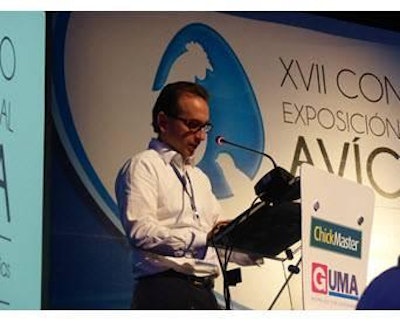
that soon Colombians will consume more eggs than beef.
Under a new format of four discussion panels moderated by well-known Colombian journalists about exports, smuggling, urban pressure and public policy, the 17th National Poultry Congress and Expo started October 1, organized by the National Federation of Poultry Producers (Fenavi) in Cartagena de Indias, Colombia. It was here in Cartagena that 20 years ago the National Poultry Fund (Fonav) was created.
Colombia is a country that produced 1.275 million metric tons of chicken and 11,000 million eggs a year, with a per capita consumption of 27.1 kg and 236 units, respectively.
The Congress slogan "Poultry industry: The industry that feeds Colombia" is very relevant, because the Colombian poultry industry produces more than 2 million tons of animal protein per year. It has become so important, that these figures are getting closer for the average Colombian to soon consume more eggs than beef.
Andrés Valencia, chief executive officer of Fenavi of Colombia, in his opening speech said that the poultry industry is sustaining feed grains producers and driving the packaging industry. He described the poultry industry as the locomotive (the driving force) of the agricultural sector. He estimated the value of the industry is COP8 trillion (US$4 billion).
But being productive is not synonymous with being competitive. Colombia faces dependence on the international grain markets, lack of infrastructure to transport raw materials and finished products, and excessive regulations. Regarding the first obstacle, the Free Trade Agreement with the United States has been crucial, because now more than 2 million metric tons of corn enter the country without tariffs. That is why Valencia emphasized "that access to raw materials should not be hindered, like in Venezuela," a country with which Colombia faces the serious problem of the smuggling of 1,500 metric tons of chicken and 1 million eggs per month. Colombia also has the same problem with Ecuador, albeit minor.
Valencia also specified that "Colombia is called to be an agricultural world power and a food pantry for the world, because today Colombia ranks 23rd of 223 nations that can afford to expand their agricultural area without affecting the natural conservation area."
















